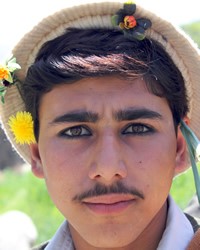Pashayi, Northeast in Afghanistan

Photo Source:
Todd Huffman - Flickr
Creative Commons
|
Send Joshua Project a map of this people group.
|
| People Name: | Pashayi, Northeast |
| Country: | Afghanistan |
| 10/40 Window: | Yes |
| Population: | 54,000 |
| World Population: | 54,000 |
| Primary Language: | Pashai, Northeast |
| Primary Religion: | Islam |
| Christian Adherents: | 0.00 % |
| Evangelicals: | 0.00 % |
| Scripture: | Translation Started |
| Ministry Resources: | No |
| Jesus Film: | No |
| Audio Recordings: | Yes |
| People Cluster: | South Asia Muslim - other |
| Affinity Bloc: | South Asian Peoples |
| Progress Level: |
|
Introduction / History
The Northeast Pashayi, also called the Pashi, are in the South Asia Muslim - other people cluster. They live in Afghanistan, mostly in the valleys of the Hindu Kush in northeastern Afghanistan. They tend to live in valleys located near major river systems. The Northeastern Pashayi mostly live in the Kunar Province, in the side valleys between the Kunar and Pech Rivers. It is believed that the Pashayi once inhabited the northeastern plains of Afghanistan, however they were forced to move to the mountains as Pashtun warriors invaded their areas. Very few people actually refer to themselves as Pashayi, rather they call themselves Safi, Kohistanis, or Nuristanis. Pashayi, a Dardic language, is their primary language and has many dialects. The northeastern Pashayi speak the northeastern dialect of Pashayi, which is unintelligible to other Pashayi speakers. This is why there will need to be a separate church planting movement among each Pashayi subgroup.
What Are Their Lives Like?
The Pashayi are mostly rice farmers, for those living at lower elevations, and wheat and maize farmers and herders, for those living at the higher elevations. Pashayi are tribal peoples. They are often led by a village council which is the authority on issues affecting the entire village. The council is composed of extended family members from each family unit. Personal disputes are left to be resolved by the individual who was hurt in some way, which often leads to feuds. The Pashayi value masculinity and honor more than anything else. To them the ideal man is one who is a proud warrior, loyal to his family, dangerous to his enemies, and always prepared to deal with a feud. Every Pashayi man carries a knife or a gun. The Pashayi culture has a rich tradition of songs and folklore which is passed down by oral tradition. Songs are often sung about their culture and traditionally, around harvest time, the young people in the village travel to other villages to sing the songs they'd composed throughout the year.
What Are Their Beliefs?
The Pashayi converted to Sunni Islam in the late sixteenth century. Many Pashayi have maintained some Folk Islamic practices, and it is not uncommon for Pashayi men to leave their communities to study under Pakistani or Afghani holy men. There are shrines dedicated to saints throughout their areas. There are few, if any, known believers or churches among them. There are Christian audio recordings in this language.
What Are Their Needs?
The Pashayi people need to submit to Jesus Christ so they can experience the abundant life He offers them in John 10:10.
Prayer Points
Pray that the Pashayi people will have a spiritual hunger that will open their hearts to the King of kings. Pray for workers who are driven by the love and boldness of the Holy Spirit to go to them. Pray for a Disciple Making Movement among them to begin this decade.